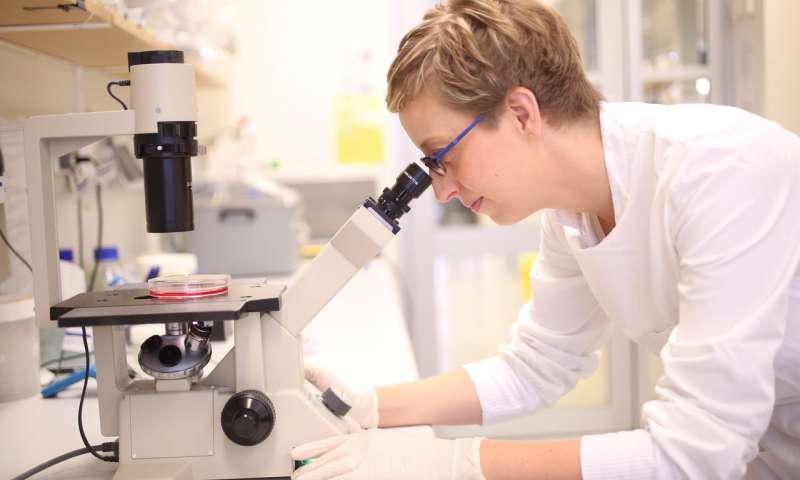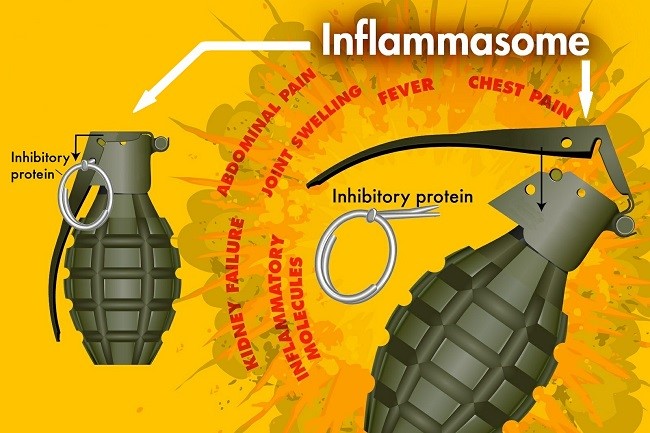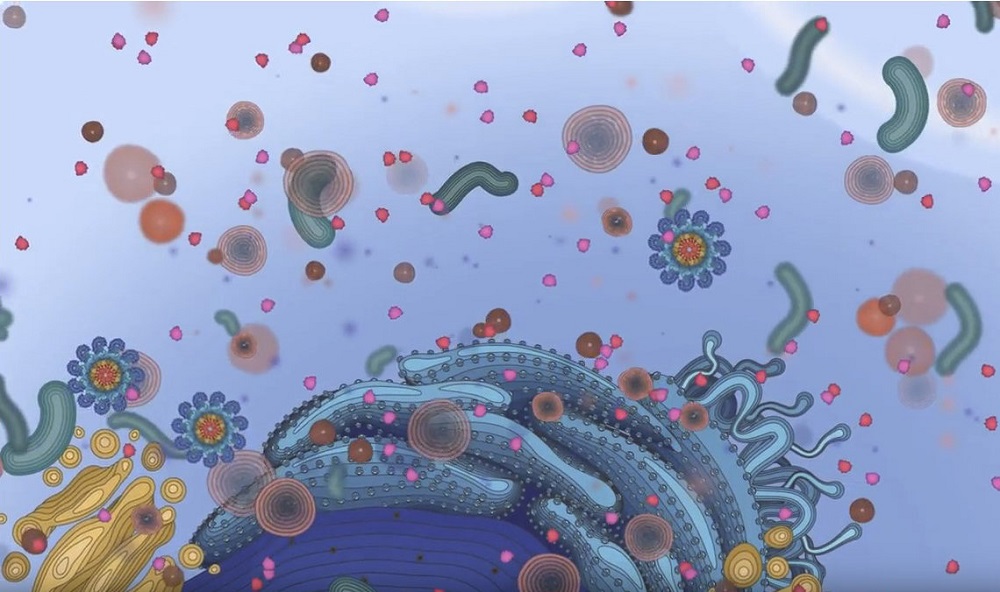Researchers discover off-switch to inflammation machine at the root of our chronic diseases
Summary: Researchers discover what may be the key to stopping uncontrolled inflammation and the damage it causes in a multitude of chronic diseases. [This article first appeared on LongevityFacts.com. Author: Brady Hartman. ]
A discovery by researchers at the University of Queensland (UQ) could be the key to stopping the damage caused by uncontrolled inflammation in a range of chronic diseases including Alzheimer’s and liver disease.
Queensland scientists have uncovered how an inflammation process automatically switches off in healthy cells, and are now investigating ways to stop it when it runs amok. The finding may lead to a way to turn off chronic low-grade inflammation without interfering with the body’s natural defenses against infection.

Associate Professor Kate Schroder at the UQ’s Institute for Molecular Bioscience (IMB) says this inflammation pathway drives many different diseases. Dr. Schroder is the Deputy Director of the IMB Center for Inflammation and Disease Research at the university. As she puts it,
“Now that we understand how this pathway naturally turns off in health, we can investigate why it doesn’t turn off in disease—so it’s very exciting.”
Professor Schroder’s work focuses on inflammasomes, which are tiny molecular complexes at the heart of inflammation and disease.
What Are Inflammasomes?
In an extensive review in 2015, a research team in Shanghai, China confirmed that all inflammatory diseases share a common process called an inflammasome and published their findings in the journal Frontiers in Pharmacology. Inflammasomes are tiny molecular complexes involved in inflammatory diseases, including multiple sclerosis, type 2 diabetes, Alzheimer’s disease, and atherosclerosis. The Chinese team confirmed that inflammasomes played a key role in all inflammation, regardless of the body part.
Professor Schroder describes inflammasomes more distinctly, saying
“These complexes form when an infection, injury or other disturbance is detected by the immune system, and they send messages to immune cells to tell them to respond,” adding, “If the disturbance can’t be cleared, such as in the case of amyloid plaques in Alzheimer’s, these molecular machines continue to fire, resulting in neurodegenerative damage from the sustained inflammation.”

When the body is under attack by stress or pathogens, it forms inflammasomes that start the inflammatory process throughout the body, putting the body into full-blown fever and inflammation to annihilate the pathogen. Once created, inflammasomes are like grenades, ready to explode whenever the immune system needs to escalate the fight against infection and raise the level of inflammation. Once the inflammasome is activated, it produces pro-inflammatory molecules to destroy pathogens. Researchers at the National Human Genome Research Institute (NHGRI) discovered an inhibitory protein that works like a safety pin on a grenade. It acts as a guard mechanism to keep the inflammasome from exploding until its needed. However, in certain diseases, the inflammatory response goes haywire, and the safety pin gets pulled by accident.
Queensland’s Discovery of a Timer
However, Dr. Schroder’s team discovered that inflammasomes also have a built-in timer switch, to ensure they only fire for a certain length of time once triggered. As professor Schroder says,
“The inflammasome initiates the inflammation process by activating a protein that functions like a pair of scissors, and cuts itself and other proteins,” adding, “What we’ve found is that after a period of time this protein cuts itself a second time to turn off the pathway, so if we can tweak this system we may be able to turn it off manually in disease.”
Professor Schroder’s team, headed up by Dr. Dave Boucher, is studying the inflammasome in fatty liver disease, due to the rampant increase in ‘diabesity’ a combined epidemic of diabetes and obesity. Dr. Schroder adds,
“In some patients with this condition the liver becomes increasingly fatty and inflamed, and this can lead to cirrhosis – which can require liver transplantation – or even liver cancer.”
Scientists at the IMB are developing compounds to block the inflammasome and commercializing their development to bring them to the clinic.
Bottom Line
The important implication of this finding is that inflammasomes are a convenient centralized target to attack inflammation at its roots, along with the chronic diseases that accompany it. Turning off the inflammasome can turn off chronic low-grade inflammation without interfering with the body’s natural defenses against infection.
Show Us Some Love
- Share this post on social media and help us spread the word– It only takes one click on any of the social media links on this page.
- Follow us on social media – Google+ or Reddit
- Sign up for our email list – We use your email to notify you of new articles. We will not send you spam, and we will not share your email address. You can cancel at any time.
- Tell us what you think – Scroll down to enter your comments below.
References
Cover photo credit: Kate Schroder, University of Queensland.
“Scientists discover off-switch for ‘molecular machine’ active in many diseases.” University of Queensland. February 6, 2018. Link to press release.
Shao, Bo-Zong et al. “NLRP3 Inflammasome and Its Inhibitors: A Review.” Frontiers in Pharmacology 6 (2015): 262. PMC. Web. 7 Feb. 2018. Link to journal article.
Disclaimer
Diagnosis, Treatment, and Advice: This article is intended for educational and informational purposes only and is not a substitute for qualified, professional medical advice. The information and opinions provided herein should not be used during any medical emergency or for the diagnosis or treatment of any medical condition. Consult a qualified and licensed physician for the diagnosis and treatment of any and all medical conditions. Experimental therapies carry a much higher risk than FDA-approved ones. Call 911, or an equivalent emergency hotline number, for all medical emergencies. As well, consult a licensed, qualified physician before changing your diet, supplement or exercise programs.
Photos, Endorsements, & External Links: This article is not intended to endorse organizations, companies, or their products. Links to external websites, mention or depiction of company names or brands, are intended for illustration only and do not constitute endorsements.
